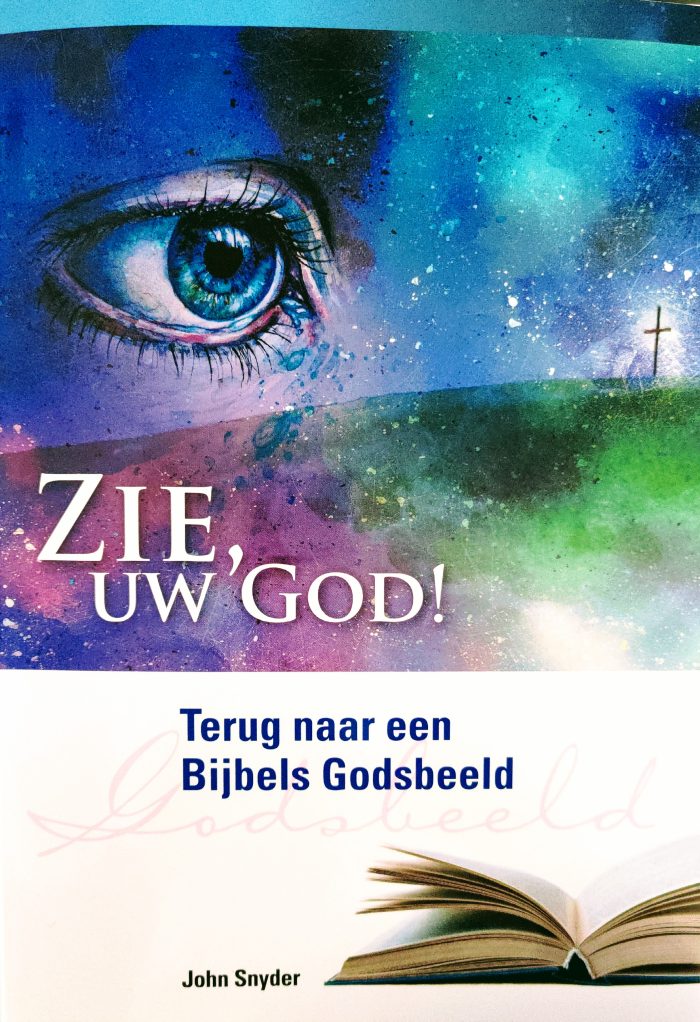Here comes a story so bizarre you can hardly comprehend it. At least, that's how it goes for me. It shows how God's adversary Satan can deceive Christians. We often think too small of our God, but we also sometimes think much too small of the devil. That can have fatal consequences.
We're going to list some things you may not have heard of, but we'll try to keep it as simple as possible. We hope you want to follow it to the end.
Wanneer je al eerder op deze site geweest bent en met de onderwerpen bekend bent, kun je het eerste deel, overslaan en direct verder gaan bij ‘Waar gaat het nu weer om’.
- Mystical – that which is greater than ourselves
- The God of the Bible speaks to our minds
- How God's people can be deceived
- What is this all about again
- Background and objective
- A textbook with Bible texts and quotes
- The big lines
- Review in outline
- beholding God
- The quotes
- In conclusion – the law and the deception
Mystical – that which is greater than ourselves
We moeten het eerst hebben over wat wel ‘mystiek’ wordt genoemd. Het is een wereldwijd en van alle tijden het streven van de mensheid om contact te hebben met wezens in de onzichtbare wereld. Je kunt er (te) veel informatie over vinden op internet. Maar een eenvoudige en herkenbare beschrijving kwam ik tegen op de site van de Nederlandse stichting voor mystiek (website). You can read it below, remembering that this is the way Satan takes over people who are open to it. It is of all times and happens in all religions.
What is Mysticism?
Mystiek komt in alle tijden en alle religies voor. Je zou mystiek kunnen omschrijven als je aangeraakt voelen door Datgene dat jou als mens volkomen overstijgt, en waar je toch in je kern één mee bent.
Mysticism is associated with the desire, and often with the experience, to be one with it and to be absorbed in it.
The mystical consciousness can be very strongly present in a person from early childhood, or it can arise in a long growth process.
Mystical breakthrough experience
Often there is a mystical breakthrough experience, in which a person becomes aware with a shock that he is being touched by That which cannot be expressed in words, and with which he can have strong feelings of oneness during that experience.
For example, such an experience can take place in or after a crisis in life, or in nature, where a person can feel one with the greater whole of which he is a part.
Mystical road
The mystical breakthrough experience is followed by a mystical path, which is different for each person, as the time and culture in which that path takes place, but also personal history and character traits color the path.
But there are clear similarities, such as:
– placing yourself less and less central, the so-called 'little me' and
– the increasingly centralization of the Essence, the core, the Divine, God, the Divine Love, Consciousness, or however the mystic tries to indicate That which cannot be put into words.
The latter also characterizes one of the many paradoxes associated with the mystical path.
The mystic wants nothing more than to sing the Secret in the most lyrical words, but realizes again and again that That Which Is, and that the Secret of all things is, can only be indicated, but never captured in words or images.
Transformation
The mystical path entails a profound process of personality transformation, in which love for one's fellow man and for all living things plays a major role.
The mystic becomes a human being who only wants to serve.
It's not about himself anymore. This dying process of the self-involved 'I', in order to be born more and more in Divine Love, is a lifelong journey.
Social awareness
Over the centuries, mystics have committed themselves in many ways to their neighbors and nature as an expression of this mystical path. For example by:
• care for the sick/pastoral to the sick
• taking action against the war in Vietnam and against nuclear weapons
• supporting refugees
• fighting poverty
• care for nature and the climate.
Laten we meteen maar heel helder zijn. Wat je hierboven leest is de manier waarop satan ‘mensen van goede wil’ misleidt. Ze verlangen naar iets moois – van hun god of hoe ze het ook mogen noemen – uit de onzichtbare wereld. Wanneer mensen daarvoor open staan – het gebeurt je gelukkig niet zomaar! – geeft hij een bijzondere innerlijke ervaring, die hierboven de doorbraakervaring is genoemd. Dat is het begin van een ander leven: verlicht en veranderd. De duivel geeft de mens innerlijke ervaringen waardoor ze menen het geluk in zichzelf gevonden te hebben en ze betere mensen worden.
Satan uses his demons to do this. Humanity discovered early on how to bring the invisible world to itself. In many ways, one can eliminate thought and allow the demons access to the soul to work within it. In religious settings, meditation is a proven means of achieving "the mystical experience within you.

Ook in de christenheid meent men dat God – of de Heilige Geest of Jezus – zo’n ervaring geeft aan hen die dat willen. Ze horen Gods stem, worden in de Geest gedoopt, ze voelen het vuur van de Geest, ervaren een grote liefde voor Jezus, of wat dan ook. Maar de vraag is of dat de manier is waarop de God van de Bijbel in ons werkt.
The God of the Bible speaks to our minds
The description of mysticism above superficially resembles the way God works in man and brings him to repentance and faith, but that is not correct. Our God speaks to us only because we think about what He speaks to us and base our beliefs and choices on it. The Bible is the Word of God to us and what He reveals in it we should try to understand.
That God speaks to our minds is important for several reasons.
- God has consciously made man different from the animals. We have been given reason, ratio, understanding. That makes us specifically human, but at the same time 'image of God'. This allows us to think, analyze problems, come up with alternatives, make a choice and then also ensure that it is implemented. That is what makes us typically human and 'image of God'.
- Thought belongs to the domain of the human mind. It's a bit clearer in English; for that you use the word 'mind'. God gave man a spirit so that He could communicate with man. God gives words to understand, man thinks about them and will respond to them.
- God loves man, but does not want to force him to obey or love Him. That is why He addresses man with words, so that man can think about it. Then man comes to a conclusion and decides whether or not to accept what God has said.
- Thought is also relevant to normal human existence as God intended. After the fall, man must distinguish between good and evil and you do that in normal functioning. You constantly observe the environment with your senses and if there are dangers, you have to react to them. Someone who is drunk perceives the world around them differently and is not or much less able to respond adequately to imminent danger.
Our thinking also has everything to do with our mind. Look up where that word is everywhere. Here I mention two things:
- In the book of Proverbs the word appears very often. It has everything to do with following the way that the Lord God has set before us. We have to keep that in mind.
- In zijn eerste brief schrijft Johannes: “Maar wij weten dat de Zoon van God gekomen is en ons het verstand heeft gegeven om de Waarachtige te mogen kennen” (1 Johannes 5:20).

What God wants to make clear to us in the Bible is that we are lost people; a hopeless situation. But then He Himself comes with His solution. He Himself gave a sacrifice for our sin: His own Son became flesh and became the Lamb of God. Whoever believes in Him has eternal life! God calls every person to believe that very personally! Seeing that you are an incorrigible sinner and wanting to be saved by a Savior who Himself has suffered your judgment!
Dit is de basis voor een leven vol blijdschap, want je weet dat Christus Jezus voor jou het oordeel van de heilige God gedragen heeft. Je bent daardoor gered -uit geloof – zodat je straks niet zelf het oordeel eeuwig hoeft te dragen. Sterker, je mag uitzien naar dat nieuwe leven dat straks komt om de heerlijkheid van de Heer Jezus te delen! Daar mag je Hem elke dag en zo veel als je wilt voor danken; het is het grootste wat je God kunt geven!
This faith must be held by a believer throughout his life. But you also have to grow into it, that is, understand more and more Who the Lord Jesus Christ is and what His work actually means. But for that too we need the Word of God, to make us grow in faith, so that our lives will be more devoted to the Lord.
Now God also gives His Spirit to everyone who turns to Him and believes in the Lord Jesus. That Holy Spirit works for us to love the Lord Jesus more and will help us to understand the truth of God's Word.
It is essential that the Holy Spirit is not dominant in us; He doesn't force us to say it just like that. He will guide us step by step in our life of faith. As human beings, we always have the option to accept something or not. The Spirit wants to make it clear, but luckily He also has patience with us. The same patience that the Lord God also has.
To live by faith as a Christian, two things are of great importance
- Je blijven verblijden in Christus en Zijn verlossingswerk en Hem daarvoor – eigenlijk elke dag – danken. Zorg dat je je vreugde en blijdschap in Hem niet verliest!
- Keep reading the Word of God. Then God's Spirit can give you insight into what that Word says about God and His plans in Christ. Then those things will be able to be established in your heart.

How God's people can be deceived
What we have discussed above will probably raise the necessary questions for you. But we will leave that aside for now, because we have to continue with what we have described above. The main point was to show some essential differences between the way Satan works and the way the God of the Bible works.
In het Oude Testament heeft God het volk duidelijk gezegd dat ze Hem alleen maar konden dienen – dat is: tot Hem konden naderen – op de manier die Hij hen duidelijk gemaakt had. Ze mochten onder geen beding tot Hem naderen op de manier zoals de heidenen tot hun goden naderden. Hij verbiedt het ze onomwonden:
“… dat u niet vraagt naar hun goden, door te zeggen: Zoals deze volken hun goden gediend hebben, zo zal ik het ook doen. U mag ten aanzien van de HEERE, uw God, niet doen zoals zij!”
Deuteronomy 12:30-31
De bijbel noemt het afgoderij – de goden dienen – en gebruikt er het woord afval voor (bijvoorbeeld Deuteronomium 13:5; Jesaja 31:6;47:10; Jeremia 3:12; 28:16). Deze ongehoorzaamheid is de hele geschiedenis door het grote probleem bij Israel geweest. Ze meenden steeds werkelijk dat datgene wat ze in hun innerlijk ervaarden van de Here God kwam. Maar het was van de demonen en zo noemt de Here het ook (bijvoorbeeld Leviticus 17:7). Het bizarre is dat ze zonder het zich te realiseren niet de Here God dienden, maar de demonen, de goden van de heidenen. Uiteindelijk was het de oorzaak dat ze niet het beloofde land in mochten en later werden ze daarom naar Babylon verbannen.
In the New Testament it is exactly the same story. Satan will try to tempt Christians by the same means. All the letters of the apostles warn against it. This is not the place to elaborate on it here. Just a few references from the New Testament
- The event of Israel in the wilderness is used in three places in the NT as a warning to us. They are 1 Corinthians 10:1-22; Hebrews 3:7-12 and Jude 1:5.
- In Korinthe was men in de gemeente bezig met heidense praktijken. Paulus keurt dit ten strengste af en zegt dan zelfs “Ik wil niet dat u met de demonen gemeenschap hebt.” (1 Korinthe 10:20). Misschien wel een van de minst begrepen waarschuwingen in het Nieuwe Testament.
- Also in the New Testament apostasy or apostate is connected with idolatry (eg 1 Timothy 4:1 and Hebrews 3:12; 6:6).
- The apostle John closes his 1th write with it: “Dear children, beware of idols” (1 John 5:21).
But even now Satan still uses the same tactics. He promises the Christian that there is still more. 'Do you really know that you are right with your faith? Are you really a Christian? Have you received the Spirit of God? There is more to discover, God gives even more if you want it. In fact, only then do you become a good Christian.'
This has been the case for 2,000 years and with increased intensity in recent decades.
What is this all about again
The reason for all of the above is to give you some tools to judge things and to be able to follow me in the story that follows. Because recently I was confronted with “Behold your God!” a few times in a row. (see here) from HeartCry. When I got it from someone, along with the DVDs that came with it, I had to go through it.

It is a 'Bible course' consisting of a workbook of almost 250 pages A4 and a set of 12 lessons on DVD. In 12 weeks you work through the book - a chapter every day - and every week you watch the relevant DVD at the end of the week. The subtitle is “Back to a Biblical Image of God.”
Zelf heb ik het werkboek doorgenomen en de twee eerste dvd’s bekeken. In zal in dit artikeltje verslag doen van de dingen die ik tegenkwam. ‘k Moet zeggen dat het schokkend was wat ik ontdekte. Wat ik ook verwacht had, dit niet. Het is zo’n onwerkelijk verhaal dat ik het bijna niet uit het toetsenbord krijg.
Background and objective
De aanleiding voor het schrijven van deze cursus is dat de schrijver – voorganger John Snyder – op enig moment constateerde dat de evangelische beweging in de VS sterk achteruit ging. Zijn tweede constatering was dat het niet hielp wanneer hij preekte tegen verkeerd gedrag van gemeenteleden. Zijn conclusie was dat hij terug moest naar het blootleggen en aanpakken van de zondige wortels, de onderliggende oorzaken.
Now this is fine in itself, the bible always goes to the core problem. But the question is whether Snyder really gets to the root of the problem when he writes:
“. . . to repent of the low and unworthy image we have of God and return to the Biblical descriptions of the true God, and to risk everything to live for Who He is.”
You can also register for the course and on the website can you read the following:
“In this course we want to think about the Biblical image of God. It is always, but especially in this day and age, important to consider whether our image of God matches how God reveals Himself in His Word; the Bible. This course will guide you in pondering this important question.”
We'll see if the book lives up to this.
A textbook with Bible texts and quotes
The workbook is a continuous story with Bible texts and quotes. It contains many Bible texts with questions that can only be answered if you look at the Bible. That in itself is fine.

But a Bible student will still stick to the line of the workbook and then view the texts in that light. The same goes for the quotes.
In other words, the workbook presents a line of thinking supported by scriptures and appropriate quotes from preachers, theologians and poets. This suggests that what the book presents is biblical.
The lyrics themselves
When you zoom in on the texts of the workbook, things get complicated.
On the one hand, there are things in it that I think are in line with what the Scriptures say. But on the other hand, there are many things that contradict the Bible. There are pieces of text that are vague or open to multiple interpretations. Or Bible texts that are used incorrectly out of context.
In addition, caricatures and false contrasts are used, so that space is created to convey one's own message.
In short, the whole thing is rather disjointed. If we had to comment on everything that just wouldn't work; unfinished business. Moreover, no one is waiting for such a comment and no one will read it.
It is therefore not necessarily about what is good (or not good) in the texts. Discussions about this will not resolve anything and will not get to the heart of the matter.
We will therefore try to get the main ideas. We have to get the underlying line of thinking out of the book. We will continue with that below.
The big lines
There are two major themes that recur throughout the book. I will try to summarize them briefly without commenting immediately.
The first is 'beholding God'.
Almost every chapter has that phrase in the title. In each chapter 'beholding God' is then linked to a certain aspect of the Christian life. I'll just mention the chapters below to give an impression here).
- Behold your God: the great attraction!
- Clearing the way for our return
- Beholding God in the Bible
- Beholding God in the face of Jesus Christ
- Beholding God in the work of redemption
- Beholding God and Personal Holiness
- Behold Thy God: Restoring Worship in Our Lives
- Beholding God and Evangelism
- Beholding God and Our Christian Service
- Behold a lesser God?
- Beholding God: Avoiding the Lies of Pragmatism
- Seeking the God we behold
The idea behind this is that a Christian must learn to desire God because He is so incredibly attractive. When you behold Him, He becomes more important to you, you get to know Him better and things in your life will also change. That is why in the various chapters 'beholding God' is also connected with important aspects of the Christian life.
The second theme is 'behold yourself'.
It's not mentioned that way in the book; I just call it that because it is a common thread throughout the book. There is a constant call to look into your heart: look how sinful you are. But it is not enough to eradicate sin, you must also eradicate the 3 roots that underlie it. These are pride, disbelief and selfishness. Both the roots and fruits must be eradicated.
You regularly come across paragraphs with the headline: Self-examination. At the start of each new week is a streamer with the following text:
“Are you willing to adjust your life
to what God is revealing about Himself in the coming days?”
The purpose of this is to bring every corner of your heart and life under the authority of Christ.
The connection between the two themes is that the more you desire and behold God, the less sins and shortcomings you will discover. But also the other way around: if you become more holy, you get a life in which God likes to approach. But if you do not become more holy, God disappears from your presence.
At least, that's what people think.
Review in outline
First, I will review the main issues as shown above. We try to keep it as short and clear as possible.
- The book has a false start. It is not made clear that the learning process cannot begin until you have made a good start, that is, that you know that you are saved. But the whole idea of repentance, being born again, and assurance of faith in Jesus Christ is missing.
Sure, comments are being made about this left and right, but nowhere is it explained what it is to "believe" or be "saved." - That false start also ensures that the Lord Jesus Christ is not the central focus of the book. And that is the biggest flaw of all. No basis is laid for faith: Who is He, what did He do at Calvary, what is He doing for us now in heaven, and what is the nature and practice of our relationship with Him.
Wanneer de Heer Jezus Christus de hoofdpersoon van Gods Woord is – niet alleen in het Nieuwe, maar ook in het Oude Testament (Johannes 5:39) – dan moeten deze dingen uitgebreid aan de orde zijn. Immers, alles wat God geopenbaard heeft, heeft Hij gesproken in de Zoon (Hebreeën 1:1). - A resulting core problem is that it is not recognized that the Bible teaches that the sinful nature remains in the believer as long as he walks around in this mortal body. But a believer, upon conversion, receives the indwelling Holy Spirit (Romans 5:5), enabling him to love God and "live unto God" (Galatians 2:19).
- In summary, the biblical teaching that "we are justified by faith" and "live by faith" lacks elaboration. It is repeated three times in the New Testament:
- “For the righteousness of God is revealed therein from faith to faith, as it is written, But the just shall live by faith.” (Romans 1:17)
- “And that by the law no one is justified before God is evident, for the just shall live by faith.” (Galatians 3:11)
- “But the just shall live by faith, and if any draw back, my soul hath no pleasure in him.” (Hebrews 10:38)
- Instead of all this, "Behold your God!" that we must constantly eradicate sin within us so that we become more and more holy. At the same time, we need to focus on God in order to get a better, more biblical picture of Him that brings Him closer to us. That closeness is noticeable and can be so close that we are "completely engrossed in God" (p. 226).
“Those who long for God's nearness should seek the humility that comes from a heartbreaking awareness of their sins and helplessness” (p. 236). - This view is completely unbiblical, however beautifully it is decorated with biblical texts (often taken out of context) and quotes. It is a "doctrine" that we do not find in the Bible. We need to discuss the concept of 'beholding God' separately.
beholding God
Het verhaal dat ons – los van alle details – voorgehouden wordt is komt op het volgende neer.
God is incredibly great, infinite and unfathomable. We cannot reach that with our minds – our minds are utterly inadequate. Yet we need renewed knowledge of God as He really is (p. 12); a revolution in our thinking about God (p. 16). The knowledge of God is not just a vague idea that He exists "above," but it is an intimate acquaintance with His character and His works (p. 17).
Every attribute of God is infinite, immeasurable, boundlessly full. The greatness of God's character cannot be captured with your mind. It will flow beyond the boundaries of your imagination (p. 20).
Fortunately, God gives us two gifts: the Bible and His presence (p. 225). That nearness or presence of God is noticeable, you can experience it (p.226). We need God's closeness just as much as Biblical truth.
Are you willing to unlock all your doors and allow Christ complete freedom to come in and rearrange your life so that your fellowship with Him can be restored? (p.240).
The task of the Christian is to seek the God of the Bible, to long for God, to refuse to be satisfied with a distant God (p. 244).
This teaching means that in addition to the Word of God, we must also experience God's presence. We should long for that experience and continue to strive for it.
But the Bible teaches us otherwise. When we want to know Who God is and how great He is in everything, it should be about the Lord Jesus Christ. “No one has ever seen God; the only begotten Son, who is in the bosom of the Father, He has declared Him to us” (John 1:18).
Maar wat ons hier gepresenteerd wordt is een weg die – laat ik het maar simpel zeggen – mensen invoert in de afgodische roomse spiritualiteit, de contemplatie[1].
The purpose of the course is that you will experience that inner experience, which is called God's presence, but it is not! After all, Satan masquerades as someone who brings light: an angel of light! (2 Corinthians 11:14).
The quotes
The workbook itself confirms this conclusion because it is full of quotations from all kinds of theologians, preachers and poets. Many of them come from the corner of the puritans. These are seamlessly combined with quotes from the contemplative corner.
The latter in particular make it clear which sources have been drawn from and to which people apparently feel related. Below are some authors cited in the course. I added some information here and there, mainly from Wikipedia. Other works by the author may also be used.
Anselm of Canterbury (1033-1109) (https://nl.wikipedia.org/wiki/Anselmus_van_Canterbury)
Citaat in Zie uw God: “Kom overeind kleine man! Vlucht even van je bezigheden weg. Verberg je zelf even voor je storende gedachten. Leg je zware lasten en je vermoeiende bezigheden van je af. Maak ruimte vrij voor wat tijd met God en rust even in Hem. Ga de binnenkamer van je ziel binnen, sluit alle gedachten buiten behalve die van God en de gedachten die je kunnen helpen om Hem te zoeken. Spreek nu, mijn hele hart Spreek tot God en zeg: Ik zoek Uw aangezicht, Uw aangezicht Here, zal ik zoeken.”
Bernard of Clairvaux (1090-1153) https://nl.wikipedia.org/wiki/Bernardus_van_Clairvaux
As a mystic, Bernard strives for a direct vision of the Divine Truth that God is Light. For him no image is strong enough to represent the experience of the divine reflection.
Ignatius of Loyola (1491-1556) (https://nl.wikipedia.org/wiki/Ignatius_van_Loyola)
Quote in Behold your God: "Let nothing overpower you but Christ".
Ignatius of Loyola is one of the most famous Catholics. He is the leader of the Roman Catholic Counter-Reformation. The Jesuit Order (see here Wikipedia or their own website) waar hij de stichter van was, is nog steeds zeer actief in het bestrijden van de protestantse christenheid. Het doel van de orde was ‘spirituele vernieuwing, het zuiveren van de ziel, het corrigeren van dogmatische onkunde, het uitbannen van zonde en bijgeloof’. Maar dan wel vanuit de roomse optiek.
Brother Lawrence (1614-1691) https://nl.wikipedia.org/wiki/Broeder_Laurentius
Quotations from Behold Thy God: “To go to God requires no science or art, but only a heart determined to dedicate itself to nothing but Him, for His sake and for Him alone”
“There is no life in the world more beautiful than a life in constant conversation with God” (p 235).
From Wikipedia:
“De aanwezigheid van God, een beetje pijnlijk in het begin, trouw beoefend, bewerkt heimelijk in de ziel prachtige effecten, trekt overvloedige genade van de Heer en leidt haar onmerkbaar tot deze eenvoudige blik, tot deze liefdevolle blik van Gods alomtegenwoordige aanwezigheid, die de meest heilige, meest solide en meest effectieve manier van bidden is.”
“De aanwezigheid van God is, naar mijn gevoel, waar het hele geestelijke leven uit bestaat en het lijkt me dat door goed oefenen, men in korte tijd spiritueel wordt.”
“Ik geloof niet; maar ik zie, ik heb ervaren wat het geloof ons leert.”
Henry Blackaby https://blackaby.org/experiencing-god/
Blackaby has a vast 'ministry' to help Christians experience God. He has spoken at a HeartCry conference before.
A.W.Tozer (1897 – 1963) https://en.wikipedia.org/wiki/A._W._Tozer
De auteur van Zie uw God heeft veel van Tozers werk bestudeerd en een levensbeschrijving van hem gemaakt. Dit is terug te vinden in Zie uw God. Veel citaten zijn van Tozer en in de eerste video wordt verteld hoe zijn gedachtengoed de inspiratie was voor deze cursus. Hieronder een paar citaten uit Tozers werk die gaan over ‘de stilte’ en ‘geestelijke oefeningen’ (spiritual disciplines).
From: Experiencing Gods Presence (pp. 213,214)
“Loneliness is perhaps one of the hardest of ours spiritual disciplines. Everything in our lives and the world around us weakens this. Because of the difficulty, this discipline is very important. What could be more important than sitting in silence before God?
Vaak, als we tot God komen in gebed, komen we met… een boodschappenlijstje van dingen waar we om vragen. Ik geloof in het vragen van God om dingen. Ik geloof dat het belangrijk is om voor God te komen met een lijst van dingen die we Hem toevertrouwen. Maar nadat alles dat gedaan is, moet er wat tijd besteed worden aan het cultivating silence for His presence.
Dit vergt oefening en discipline, dat garandeer ik je, en zal niet gemakkelijk zijn. (…)
Coming before God in silence and waiting on Him in silence can sometimes accomplish more than days and weeks of feverish activity.
David begreep dit heel goed. Onder invloed van de Heilige Geest schreef hij: “Wees stil en weet dat ik God ben: Ik zal worden verheven onder de heidenen, Ik zal verhoogd worden op de aarde” (Ps. 46:10). Het is in de stilte dat we het kloppende hart van God gaan zien en horen. Alle nerveuze activiteit van onze cultuur belemmert ons om God echt te leren kennen zoals Hij zich wil openbaren. We moeten deze Amerikaanse mentaliteit overwinnen die zegt dat een moment van stilte een verspild moment is. The discipline of silence is the price we pay to know God.”
From: Pursuit of God – Foreword (1948)
“In this hour of almost universal darkness, an encouraging ray of light appears: within the fold of conservative Christianity, there are more and more people whose religious life is marked by a growing hunger for God Himself. They are eager for spiritual realities and laten zich niet afschrikken door woorden, noch door correcte “interpretaties” van de waarheid. Zij zijn dorstig naar God, en ze zullen niet tevreden zijn totdat ze diep gedronken hebben uit de fontein van levend water…”.
In conclusion – the law and the deception
Finally, a few remarks about the combination of 'striving for sanctification' and 'experiencing the nearness of God'.
The course places a heavy emphasis on complying with the moral law of God. For example, on page 119 it says:
“God's moral law has two purposes:
1. The law reveals the sin of mankind and leads us to Jesus as our only hope.
2. The law guides those who have already come to Christ and desire to express their love to God in a life of obedience.”
Paul begins the letter to Timothy with a section about teachers of the law who have no understanding of what they are saying and strongly emphasize it. Paul corrects them and says: 'the law is not for the righteous(1 Timothy 1:9). In doing so, he teaches directly against the teaching of Behold your God.
Dat je daarmee Christus kwijt raakt schrijft Paulus aan de Galaten die ook de wet probeerden te hanteren: “You have become detached from Christ, you who would be justified by the law; and with that you have fallen from grace.” (Galaten 5:4).
Using the law to impose high moral standards on believers is spiritually speaking death in the pot.

Because Paul writes to Timothy that you will eventually end up in idolatry. Read it in 4th chapter (1 Timothy 4:1-5) about those who will apostatize from the faith in later times. This happens because they listen to those who pretend to be beautiful, but are hypocrites. They reject what God gives (marriage and food) because they believe it makes them holier. We clearly see here a reference to the monastic life, where one strives for greater holiness while at the same time rejecting God's gifts of grace.
In the same brief letter, Paul warns against false teaching that apparently begins with high moral standards (the law) and ends up in contemplation with its inner experiences of God. False teachings that ultimately lead to idolatry. Also in 2023 and also at HeartCry. It's unbelievably sad.
Like Timothy, we are called to keep the trust that has been entrusted to us. We pray that this blog may contribute to that.
“O Timothy, keep your trust,
avoiding the profane and idle babblings and
contradictions of what is falsely called knowledge.
Some, who proclaimed this knowledge,
have departed from the faith.
Grace be with you. Amen."
– 1 Timotheüs 6:20-21 –
Related articles
Wat de Bijbel afgoderij noemt – https://goddienen.nu/afgoden-dienen/afgoden-dienen/
Afgoderij in de christenheid – https://goddienen.nu/afgoden-dienen/afgoderij-in-de-christenheid/
Over de contemplatie – https://goddienen.nu/afgoden-dienen/afgoderij-in-de-christenheid/de-weg-van-de-contemplatie-spiritualiteit/
Wat is: God dienen? – https://goddienen.nu/god-dienen/
De kern van het christenleven – https://goddienen.nu/en/serving-god/the-core-of-your-christian-life/
De wedergeboorte – https://goddienen.nu/god-dienen/de-heilige-geest-en-de-wedergeboorte/
Wandelen naar de Geest – https://goddienen.nu/god-dienen/wandelen-naar-de-geest/
Footnotes
[1] Contemplation also means to behold or contemplate. The core of this word is temple, the sanctuary within you.



